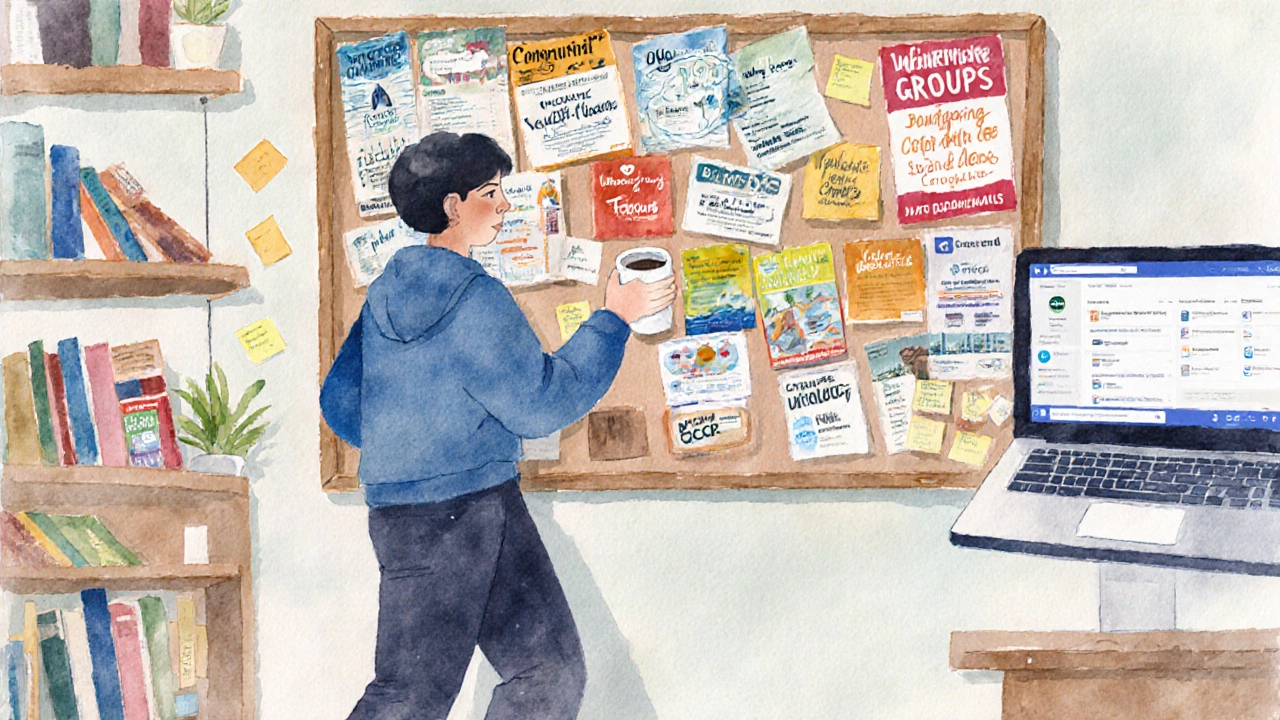Support Network Finder
This tool helps you identify which types of support networks might work best for your situation. Answer a few questions to get personalized recommendations.
What type of support are you primarily looking for?
What's your preferred way to connect?
How much time can you dedicate weekly?
Recommended Support Network Types
Next Steps
When you feel like you’re going it alone, a support network is a group of people who provide emotional, practical, or informational help when you need it. Whether you’re coping with stress, looking for career advice, or just want more friends, the right network can boost your resilience and give you a sense of belonging.
Why a Support Network Matters
Research from the University of Auckland shows that adults with a strong social circle are 50% less likely to develop chronic anxiety. Real‑world examples speak louder than stats: a single mother in Christchurch turned to a local community group that organizes weekly playdates, and within months she had childcare help, grocery swaps, and a few close friends.
In short, a support network can:
- Offer emotional validation when you’re down.
- Provide practical assistance, like rides, tutoring, or job leads.
- Introduce new perspectives that spark personal growth.
Step1: Clarify What You Need
Before you start hunting, ask yourself three quick questions:
- Am I looking for emotional support, practical help, or professional guidance?
- Do I prefer face‑to‑face interaction or online anonymity?
- How much time can I realistically dedicate each week?
Answering these helps you narrow down the type of support network that fits your lifestyle.
Step2: Scan Your Local Landscape
Most cities have multiple entry points for in‑person connections. Here are the most common options:
- Community groups - clubs, hobby circles, or neighborhood watches that meet regularly.
- Volunteer organizations - NGOs like the Auckland City Mission or local beach clean‑up crews. Volunteering gives you a purpose plus teammates.
- Local meetups - platforms such as Meetup.com list gatherings for everything from board‑games to tech talks.
- Peer support groups - facilitated groups for specific challenges (e.g., grief, addiction, new parents).
Start by browsing the Auckland Council’s community events calendar or checking bulletin boards at libraries and cafes. Attend one event with an open mind and see how you feel.

Step3: Tap Into Online Spaces
Digital platforms broaden your reach beyond geography. Consider these proven avenues:
- Online forums - Reddit’s r/mentalhealth, or niche boards like WhatToExpect.com for new parents.
- Social media groups - Facebook or Discord servers dedicated to hobbies, chronic illness, or career networking.
- Mentor platforms - sites such as Mentorloop pair you with experienced professionals.
When joining, read the community guidelines, introduce yourself briefly, and observe the tone before jumping into conversations. A small, genuine comment often sparks a lasting connection.
Step4: Leverage Existing Relationships
Sometimes the best network starts right at home. Reach out to:
- Co‑workers who share lunch breaks.
- Family members who might know someone with similar interests.
- Old school friends you’ve lost touch with-reconnect via LinkedIn or a quick text.
Being clear about what kind of help you’re seeking makes it easier for them to point you toward the right people.
Step5: Join Structured Support Programs
If you need a more formal setting, look for programs that combine professional facilitation with peer interaction:
- Counseling services - many practices run group therapy sessions for anxiety, depression, or life transitions.
- Employee assistance programs (EAP) - your workplace may offer confidential counseling and support groups.
- Faith‑based or cultural groups - churches, mosques, or iwi gatherings often have informal support circles.
These settings give you a safe space to share while also learning coping strategies from professionals.

Step6: Build and Nurture Your Network
Finding people is only half the battle; maintaining relationships requires intentional effort:
- Regular check‑ins - a quick message or coffee meet‑up every few weeks keeps the bond alive.
- Reciprocity - offer help when you can; support feels natural when it’s two‑way.
- Set boundaries - be clear about what you can give and what you need, preventing burnout.
Track your contacts in a simple spreadsheet: columns for name, type of support, contact frequency, and notes on recent conversations. Over time you’ll see patterns and know who to turn to for each situation.
Quick Comparison of Support Network Types
| Aspect | In‑person (Community groups, Meetups) | Online (Forums, Social media) | Professional (Counseling, EAP) |
|---|---|---|---|
| Cost | Usually free or low fee | Free in most cases | May require insurance or fee |
| Accessibility | Requires travel, limited by location | 24/7, global reach | Scheduled appointments, often local |
| Depth of connection | High - body language, shared activities | Variable - depends on platform culture | High - guided by trained professionals |
| Typical size | Small groups (5‑15) | Large communities (hundreds) | Medium groups (8‑12) for group therapy |
Action Checklist
- Define your primary need (emotional, practical, professional).
- Search local listings for community groups, volunteer orgs, and meetups.
- Join at least two online forums that align with your interests.
- Reach out to one existing contact and ask for an introduction.
- Consider a structured program if you need guided support.
- Set a recurring reminder to check in with each connection.
Frequently Asked Questions
How do I know if a support group is trustworthy?
Look for clear facilitation guidelines, a privacy policy, and, if possible, reviews from past members. Groups linked to reputable NGOs or health services usually follow stricter standards.
What if I feel anxious about attending my first meetup?
Take a friend along, arrive early to get comfortable with the space, and set a simple goal like introducing yourself to just one person. Most groups appreciate newcomers and will welcome you warmly.
Can I build a support network while working full‑time?
Yes. Prioritize low‑time‑commitment options like online forums (10‑15minutes a day) and monthly meetups. Use calendar blocks to protect those slots just like a work meeting.
Is it okay to have multiple support networks?
Absolutely. Different circles serve different purposes - a fitness club for physical well‑being, a peer‑support group for mental health, and a professional mentor for career advice. The key is to keep each connection authentic.
How can I maintain connections when I move to a new city?
Start by searching for local chapters of any groups you already belong to, then attend a few events to meet new faces. Meanwhile, keep digital ties active - video calls, group chats, or even a shared hobby blog can bridge the gap.








